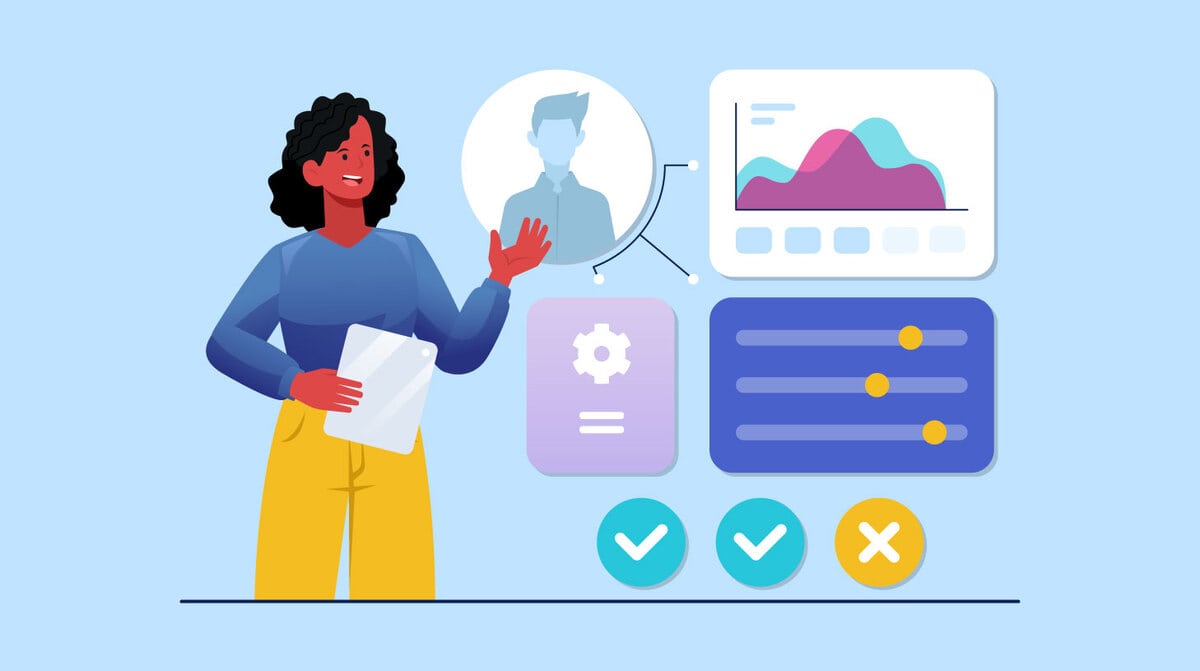Sometimes job interviews are like speed dating. You only have a short time to speak to someone and check if they’re a fit.
With limited time, every moment counts. So it often boils down to superb soft skills.
You’ve probably heard stories about people not getting a job because they didn’t possess the soft skills a company was looking for. Their technical knowledge was spot-on but they didn’t share the same values with the organization. It’s a great illustration of how important soft skills are.
So what’s the best way to check if a candidate has them? Through strategic interview questions.
In this blog post, we’ll walk you through 27 questions aimed to assess candidates’ problem-solving skills, communication, approach to work and teamwork, flexibility, values, and similar.
1. Behavioral Interview Questions
These are open-ended strategic interview questions and usually begin with “Tell me about the time when” and “Describe a situation in which you…”.
Why are they asked? Because candidates’ past experience is an indicator of how they will do in the role they’ve applied for. That’s what the majority will say.
But candidates’ answers to behavioral questions will demonstrate so much more – their speaking and listening skills, if they prepared for the interview in advance, if they can succinctly present a detailed story, if they’re able to filter information, what their approach to work is, and so on.
What they say is as equally important as how they say it. So we’d argue that this type of question can give you a holistic view of them as a person instead of just tiny bits of their professional experience so far.
Best Behavioral Interview Questions to Ask Candidates
Here’s a list of great first-round interview questions to ask candidates and why you need to ask them.
1. Tell me about a time when you had to go above and beyond to complete a project
What you’ll discover: Are they willing to go the extra mile? Are they willing to put in extra time and effort and motivate themselves and others? Where do they draw motivation from? What drives them to be the best version of themselves at work? The answer will tell you a lot about their resourcefulness, work ethic, consistency, and motivation.
2. Tell me about some regrets in your previous job
What you’ll discover: Are they able to openly talk about their regrets and be vulnerable? Can they admit regrets to themselves in the first place? Are they able to successfully overcome them? Are those regrets tied to their work performance or relationships with their coworkers or something else? The answer will tell you about their personality and how their mind works.
3. What makes an ideal company and coworkers?
What you’ll discover: Do they prefer a highly organized environment that a corporation can offer? Or do they like wearing several hats and working in the dynamic surroundings a startup offers? Do they like independent work or do they prefer being managed? What are the values they hold? Do they want to be close with coworkers? What kind of people do they work with the best? Answers to this question will tell you if your company checks all the boxes the candidate needs and if you’re a good fit for each other.
4. How do you prioritize projects under pressure?
What you’ll discover: How do they manage stress? Do they have the ability to differentiate between important and less important? How do they filter information? Are they afraid of reaching out and asking for help? Can they set work boundaries and be open about their workloads? The answer to this question will give you insight into their time and task management skills. But it’s also a window into their approach to work and the ability to set boundaries.
5. Why did you decide to leave your last job?
What you’ll discover: What are the things they value at work? What are their priorities: money, personal growth, flexibility, a supportive company culture? Will you be able to provide what was missing at their last job and keep them in your company? How do they talk about the company they worked with until recently? Are they badmouthing or are they polite and contained? The answer to this question will tell you a lot about the person’s integrity and values.
6. Give me an example of when you solved a problem at work. Describe how you did it
What you’ll discover: Are they a relentless doer or do they delegate? Do they possess analytical skills and creativity that allow them to find innovative solutions to obstacles? Do they take the initiative in the face of a problem? Problems will constantly arise. You’ll want to ensure you have a problem solver, not a complainer, on your team.
7. Describe a situation when you made a mistake at work. How did you handle it?
What you’ll discover: Do they own their mistakes or do they hide them? Are they self-aware enough to recognize their mistakes in the first place? To err does not define people. But how they deal with their mistakes does.
8. Tell me about a time when you had to learn something new. How do you approach learning at work?
What you’ll discover: The answer to this question will tell you how much value they place on life-long learning. It’s human nature to seek the familiar and comfortable. But if they’re willing to abandon their comfort zone and commit to continuous development, they might be the right fit for the company. On the practical side, picking their brain on this topic will help you adjust the onboarding and training processes in case they get hired.
What’s a Good Answer?
A good answer to behavioral interview questions will follow the STAR format.
It’s best if about 60-80% of the candidate’s answer is focused on the last Action part of the framework – it’s where the “meat” is. You’ll know you have a great candidate if they place special focus on action and lay out the details about how exactly they communicated, used their planning skills, and similar, to get the work done.
Generally, a good answer will be focused on storytelling and will leave space for you to ask follow-up questions. It’ll also be delivered in a confident and friendly way, without stuttering or using too many filler words.
What’s a Bad Answer?
There are 2 ways the STAR method can go wrong. Sometimes, the candidate is simply not a good storyteller and there’s no common thread that connects the elements into a cohesive and engaging story. In such a case, the story will be choppy and difficult to follow.
Secondly, candidates often forget to focus on the R (result) element in the story. This makes the answer end abruptly, as there’s no “tada” moment that victoriously wraps up the story and underscores the point a candidate is trying to make.
Additionally, some answers won’t have enough detail or substance. For example, you’ll ask them about a time they disagreed with a coworker and they’ll say “My coworker wanted this, but I wanted that, I explained to them why that is better and we ended up taking my approach”. That’s not a good answer. It doesn’t provide room for follow-up questions and insight into how that candidate handles negotiation.
Finally, be on the lookout for candidates who deliver their answers in a dull, robotic way. Or in a chaotic manner with lots of filler words and stuttering.
2. Situational Interview Questions
Situational and behavioral interview questions are sometimes used interchangeably. However, they’re not the same.
With behavioral interview questions, you’ll ask a candidate to recall an event from their past and tell you about it. In situational interview questions, you’ll give them a scenario and ask what they would do.
Behavioral interview questions are focused on the past; situational interview questions are hypothetical and focused on the future.
Each candidate has a unique set of experiences that can’t be compared with those of other candidates. It’s great to explore them with behavioral questions. However, the advantage of situational questions is that you can use them to compare candidates’ answers by putting them in the same situation. It’s a cool tool in cases where you can’t choose between several candidates.
Best Situational Interview Questions to Ask a Candidate
Let’s go through some situational questions to ask an interviewee.
1. You made a mistake at work. No one else noticed. What do you do?
What you’ll discover: Do they own their mistakes or try to hide them? Do they have a hard time admitting to a mistake? Do they ask for help when needed? The answer to this question (and the way it’s delivered) will tell you a lot about the candidate’s integrity and honesty.
2. You think your direct supervisor isn’t handling a situation correctly. At what point would you go above your supervisor?
What you’ll discover: How do they handle authority? Are they being compliant even if they disagree or do they raise their voice? Are they being disrespectful? Do they try to speak to the supervisor first? Or do they escalate to upper management right away? The answer to this question will tell you about how they deal with authority, but also about their communication style and the ability to handle unpleasant situations.
3. You’re in a meeting with your coworkers and managers. Your manager says they’re dissatisfied with your work on a project. You believe that your manager does not understand all the facts regarding the project. You also think your manager should not bring this up in front of everyone. What do you do in this situation?
What you’ll discover: How do they handle criticism? How do they handle being criticized publicly? Do they try to elaborate on details or do they shut down completely? Are they able to contain their ego? Do they try to have a civil, reasonable discussion? Do they take responsibility when things go awry? The answer will tell you how they handle feedback, whether they’re open towards others, if they own their work and outcomes, and similar.
4. You have a deadline to meet. It’s now due, but you don’t think your project is good enough yet. What do you do?
What you’ll discover: Were they able to anticipate this situation in the first place? How do they manage their time and tasks? Are they a perfectionist? Or are they happy with the best they can do in a given situation? Do they miss deadlines often? Are they ok with asking for extending the deadline? Are they detail-oriented? Can they be transparent about their work process and due dates? This answer reveals a lot about their approach to work but it can also reveal if a candidate is able to create healthy boundaries and ask for more time, etc.
5. You need to move a table, but your coworkers are not around. A customer offers help. Do you accept it?
What you’ll discover: Do they adhere to company policy? Or do they break the rules? Are they sharp-witted and able to make a decision on the spot? How do they approach potentially tricky situations? Are they able to clearly explain their reasoning?
6. You made a strong recommendation in a meeting, but your coworkers decided against it. What do you do?
What you’ll discover: Would a candidate take this personally? Would this hurt them? Do they accept the refusal? Do they try to elaborate and convince others to think again? Or do they suggest a compromise? Do they respect others’ opinions? The answer will tell you about their ego, how they react to being influenced by others, if they’re willing to compromise, and similar.
7. What would you do if the work of an employee you managed didn’t meet expectations?
What you’ll discover: How do they give feedback? Are they supportive? Is the feedback constructive? Are they proactive or reactive? Are they focused on a problem or on a solution? Can they create a safe environment for the person to come and talk about why they underperformed? This is a useful question when looking for a project manager or a team leader. It will tell you about a person’s ability to build and lead a successful team.
What’s a Good Answer?
There’s no correct answer here. These are open-ended questions whose aim is to show you how a person thinks.
However, each position candidates apply for has a “behavior framework”. It’s a set of skills a perfect person for that position possesses. For example, a good project manager is proactive and has to communicate effectively; needs to have negotiation skills; time and task management skills, risk management skills, etc. A designer needs to be creative, have ideation skills, superb communication and visual communication skills, and similar.
Quality candidates will have this behavior framework in mind. They will find a way to tie these skills and experiences to the hypothetical question and demonstrate them in the answer. In short, a good answer will show you that the candidate understood why you’re asking this question.
What’s a Bad Answer?
A bad answer will demonstrate a lack of behavior framework. It’ll show you that a person doesn’t understand the requirements for a certain position and how to demonstrate their skills in the answer.
Additionally, bad answers will display negativity bias – the inclination to interpret reality negatively.
You’ll notice this in two situations. First, based on the candidate’s reaction when you ask the question (people with negativity bias don’t feel comfortable answering this type of question). And second, based on the answers to questions where a candidate is publicly criticized, has made a mistake, or has their idea rejected. From these answers, you’ll probably see that a person is not able to control their ego, likes to dominate others, doesn’t accept feedback constructively, and is not open to other people’s ideas.
It’s all about how a candidate approaches the questions and explains their answers. Attitude is everything.
3. Communication Interview Questions
These strategic interview questions assess a candidate’s interpersonal skills, the ability to communicate with others, and how articulate they are.
But it’s also about how easy they are to talk to, if they actively listen, if they’re respectful and tasteful, how confident they are, if they’re empathic, and their non-verbal communication skills.
Communication is perhaps the most important soft skill relevant to any industry and position. So we highly recommend that you ask at least some of these questions in your next interview.
Best Communication Interview Questions to Ask a Candidate
1. How do you explain something difficult to someone who does not have your background or knowledge?
What you’ll discover: Are they breaking down difficult concepts into easy-to-understand information? Are they able to briefly set the context and explain the problem without going into too much detail? Can they get into someone else’s shoes to anticipate their level of understanding? Are they able to explain without being patronizing or arrogant?
2. Give me an example of a situation when you had to communicate a strategy or an objective to others
What you’ll discover: Are they able to systematically organize available information and present it in a clear, concise way? Do they check others’ level of understanding?
3. Tell me about a time you decided not to disclose information to others
What you’ll discover: Do they value transparency at all costs? What are the parameters on which they decide to share information or not? Do they anticipate the consequences of withholding or communicating sensitive information?
4. How do you deal with a difficult coworker?
What you’ll discover: Are they easy to work with? Do they display positive bias? Are they tolerant and empathetic towards others? Do they prefer to communicate unpleasant information directly or do they escalate to superiors? Are they determined to give a difficult coworker the space to relax and open up? Or do they avoid communication after a first failed attempt? What kind of people do they consider “difficult”?
5. Have you ever had a conflict at work? Tell me about it
What you’ll discover: What was it about? Do they have a short temper? Or are they quiet and don’t voice their opinions? Do they avoid conflict? How do they resolve conflict? Are they keeping conflicts private or do they escalate to HR/superiors? Do they think conflicts are an inevitable part of working on a team?
6. Do you work well with other people?
What you’ll discover: Are they submissive or dominant? Do they take feedback and criticism well? What kind of people do they find easiest to work with? What are the top qualities they value in coworkers? Are they team players? Do they prefer to work alone or on a team? Do they get along well with introverts or extroverts? How do they handle authority? How do they behave when they are in a position of authority?
7. When was the last time you were angry? What happened?
What you’ll discover: What topics/areas of work trigger them? Are they able to voice their concerns and anger in a healthy way? Are they calm or do they raise their voice/make a fuss? How do they calm down when angry? How do they resolve the situation?
4. Brain Teaser Interview Questions
Why ask “Tell me about a time when you solved a problem” when you can give them a problem on the spot and see how they deal with the pressure?
That’s what brain teaser questions are for.
Brain teaser interview questions are often the most interesting strategic interview questions you’ll ask. They test candidates’ lateral thinking, analytical skills, creativity, problem-solving, close listening skills, and mathematics and logic.
There are 2 types of brain teaser questions: open-ended questions with no correct answers and questions that do have one or more right answers. Depending on the role you’re hiring for, there’s plenty to choose from.
Best Brain Teaser Interview Questions to Ask a Candidate
1. What is the angle of the hands of the clock at 8:13 am?
This is the type of question that has the right answer. The way a candidate reaches an answer (even if it’s the wrong one) will tell you about their ability to think logically, visualize concepts, and use math. Find the right answer here.
2. The Beatles need to cross a bridge at night to get to a concert. They only have 1 flashlight. They have 17 minutes to get there. The bridge must be crossed with the flashlight. It can only support 2 people at a time. John can cross in 1 minute, Paul can cross in 2 minutes, George can cross in 5 minutes, and Ringo takes 10 minutes to cross. How can they all make it to the concert on time?
This one has a single correct answer too. It tests their logic, math skills, listening abilities, and attention to detail. Here’s the correct answer: John takes the flashlight first and crosses the bridge with Paul (2 minutes). John goes back with the flashlight (1 minute; 3 minutes have passed so far). John gives the flashlight to George. George and Ringo cross together (10 minutes; 13 minutes have passed so far). George gives the flashlight to Paul. Paul crosses the bridge again (2 minutes; 15 minutes have passed). Finally, John and Paul cross the bridge together, taking 2 more minutes. That’s exactly 17 minutes.
3. How would you describe a sunset to a blind person?
An open-ended question that shows how a person thinks and how creative they are. But it can also tell you how emphatic a person is.
4. There are 2 balls a few inches apart on a flat table. Give 3 methods for getting ball #1 to touch ball #2 without touching any of the balls.
This is a question with no correct answer. It tests creativity and resourcefulness.
5. You are shrunk down to the height of a pencil and trapped in a tabletop blender. How do you escape?
Again, no correct answer, but there are some things to keep in mind. The smaller an organism is, the smaller the muscles it requires to oppose gravity. So theoretically, they can simply jump out of the blender.
However, be open to all interpretations and answers. You never know what they might reveal.
What’s a Good Answer?
A great candidate will always allow you to hear their thinking out loud. They’ll break down each step and walk you through it before announcing their final answer. But you should also ask follow-up questions if they’re not being detailed enough – just make sure to pick a good time so as not to interrupt them in a crucial moment.
Another green flag is active listening. If a candidate asks follow-up questions or summarizes key points before getting down to business, it’s probably a good sign. Brain-teaser interview questions often rely on small but significant pieces of information. So if a candidate’s radar fires up while you’re laying out the details, that’s a good sign.
A thing to bear in mind: visual learners don’t respond well to verbal instructions, so make sure you have your brain-teaser questions printed out if needed.
Lastly, remember the positive bias we mentioned earlier in this article. If a candidate approaches this question enthusiastically, it means they’re probably resourceful and open to new challenges both in life and at work. You can probably expect an engaged employee eager to create solutions to different problems.
What’s a Bad Answer?
There’s no bad answer per se. Whatever a candidate says and however they come to a conclusion will be helpful to you.
That’s why we’d say that the main tell-tale sign is a candidate’s approach to this question.
In case they say they think these questions are useless and annoying, that’s a bad sign. Not listening and not paying attention to details is another red flag.
Look for a lack of analytical skills and inability to connect the dots. Although these questions can be tough, coming up with the right answer is not important. Stay focused on your candidate’s way of thinking and approach to problem-solving instead.
Bottom Line
The best way to get to know a candidate is by asking strategic interview questions that will get them to open up. And depending on the industry and the role you’re hiring for, these questions may vary drastically.
Still, there are some “evergreens” that are bound to spark a conversation and reveal tons about candidates’ values, approach to work, and all the soft skills you’re looking for.
We hope these strategic interview questions help you assess and choose the right people for your company.



